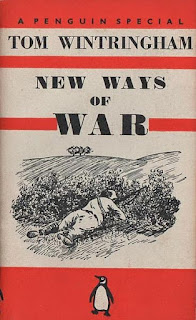New Ways of War by Tom Wintringham (40):
Wintingham set up a training-school for the new Home Guard at Osterley Park in West London, employing International Brigade veterans and exiled Spanish explosives experts as tutors. He wrote articles in the popular illustrated magazine
Picture Post. Then, in
August 1940, he published his principal military treatise,
New Ways of War. It sold
75,000 copies in the first few months. The actual readership was almost certainly much higher, as wartime paper shortages meant that books tended to be passed around.
In the book, Wintringham was withering in his denunciation of military blimps.
...
Wintringham wrote several pamphlets on the war effort including
New Ways of War (1940),
Freedom is Our Weapon (1941) and
Politics of Victory (1941).
In
New Ways of War he wrote: "Knowing that science and the riches of the earth make possible an abundance of material things for all, and trusting our fellows and ourselves to achieve that abundance after we have won, we are willing to throw everything we now possess into the common lot, to win this fight. We will allow no personal considerations of rights, privileges, property, income, family or friendship to stand in our way. Whatever the future may hold we will continue our war for liberty."
https://www.military-history.org/books/new-ways-of-war-by-tom-wintringham.htm .
https://www.marxists.org/archive/hansen/1940/12/war.htm .
Hindenberg/Siegfried Line WW1 ..
At the start of the
Spanish Civil War,
Wintringham went to Barcelona as a journalist for the
Daily Worker, but he joined and eventually commanded the
British Battalion of the
International Brigades. Some socialist commentators have credited him with the whole idea of "international" brigades. He also had an affair with a US journalist,
Kitty Bowler, whom he later married.
In February 1937 he was wounded in the
Battle of Jarama. While injured in Spain he became friends with
Ernest Hemingway, who based one of his characters upon him. He spent some months as a machine gun instructor. When he returned to the battalion the next summer he contracted
typhoid, was again wounded at Quinto in August 1937 and was repatriated in October. His later book English Captain is based on these experiences.
In 1938, the Communist Party condemned Kitty Bowler as a
Trotskyist spy but he refused to leave her: he quit the party instead. He came to mistrust the party's subservience to
Joseph Stalin's
Soviet Union and
Comintern. Back in England, Tom Hopkinson recruited him to work for the magazine
Picture Post.
On returning from Spain, Wintringham began to call for an armed civilian guard to repel any
Axis invasion, and as early as 1938 he had begun campaigning for what would become the Home Guard. He taught the troops tactics of
guerrilla warfare, including a movement known as the 'Monkey Crawl'. They were also taught how to deal with dive bombers.
At the outbreak of the
Second World War, Wintringham applied for an army officer's commission but was rejected. When the Communist Party promulgated its policy of staying out of the war due to the
Molotov–Ribbentrop Pact, he strongly condemned their policies. Because of the
appeasement policies of prime minister
Neville Chamberlain, he also regarded the
Tories as Nazi sympathizers and wrote that they should be removed from office. He wrote for
Picture Post, the
Daily Mirror, and wrote columns for
Tribune and the
New Statesman.
In May 1940, after the escape from
Dunkirk, Wintringham began to write in support of the
Local Defence Volunteers, the forerunner of the Home Guard. On 10 July, he opened the private Home Guard training school at
Osterley Park, London.
Wintringham's training methods were mainly based on his experience in Spain. He even had veterans who had fought alongside him in Spain who trained volunteers in
anti-tank warfare and
demolitions. He also taught
street fighting and
guerrilla warfare. He wrote many articles in Picture Post and the Daily Mirror propagating his views about the Home Guard with the motto "a people's war for a people's peace".
The British Army still did not dare trust Wintringham because of his communist past. After September 1940, the army began to take charge of the Home Guard training in Osterley and Wintringham and his comrades were gradually sidelined. Wintringham resigned in April 1941. Ironically, despite his activities in support of the Home Guard, Wintringham was never allowed to join the organisation itself because of a policy barring membership to Communists and Fascists.
Tom Wintringham died on 16 August 1949, aged 51, after a massive
heart attack while he was staying with his sister at her farm at
Owmby, Lincolnshire.
1943-5-15
Stalin dissolves the Comintern: promoter of worldwide communism > .
Books by Tom Wintringham:
- War! And the way to fight against it., Communist Party of Great Britain, London, 1932
- Air Raid Warning! Why the Royal Air Force is to be doubled, Workers' Bookshop, London, 1934
- The Coming World War., Wishart 1935
- Mutiny. Mutinies from Spartacus to Invergordon., Stanley Nott, London 1936
- English Captain., Faber 1939 (also in Penguin)
- How to reform the army ('Fact No. 98'), London, 1939
- Wintringham, Tom (1940). Deadlock War. Faber and Faber. ASIN B000OEKCHS.
- New Ways of War., Penguin Special 1940
- Armies of Freemen., Routledge 1940
- Ferdinand Otto Miksche: Blitzkrieg, translated by Tom Wintringham, Faber, London, 1941
- Peoples' War., Penguin Special 1942
- Freedom is our Weapon. A Policy for Army Reform., Kegan Paul 1941
- Politics of Victory., Routledge 1941
- Weapons and Tactics from Troy to Stalingrad., Houghton Mifflin, Boston, USA 1943, republished 1973 with Col. John Blashford-Snell ISBN 0-14-021522-0
- Your M.P. By 'Gracchus'. Gollancz 1944



